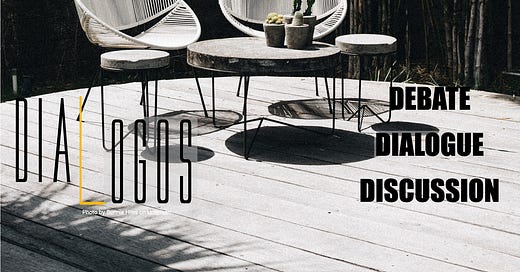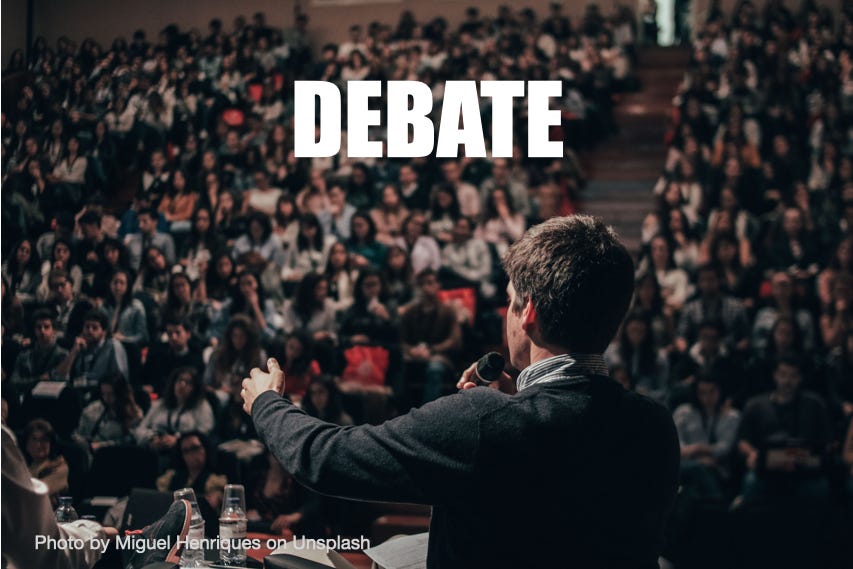Dialogue, Debate or Discussion - What's the difference?
Exploring the different forms of exchanges and conversations
“That’s a great idea for you and I!” But if you’re like me and hear such a phrase, you’ll bristle. It’s grammatically wrong. And this mistake is made all too often. The phenomenon came about because so many people got lambasted when they used “you and me” incorrectly when it was the subject of the sentence. As a result, we tend to overcompensate and default to “you and I” when we’re not sure. Words and grammar count. I know I will make mistakes in my writing, but I try to hold myself up to a high standard. That’s because words and their definitions matter and the way we express ourselves counts. [Here’s a good explanation of when to use “and me” versus “and I.”]
Last week, we looked at what makes a conversation meaningful. This week, I want to explore the word conversation and to compare and contrast with three words that are often cited as synonyms: dialogue, discussion and debate. When you look at these three words, do you have a firm idea of the difference between them? Aren’t they all a bit interchangeable? Well, let’s take a look at them and pull out what’s interesting about each when it comes to having a meaningful conversation.
DIALOGUE
Of course, dialogue is a capital word for this Dialogos Substack! The good news is that the etymology of the word is reasonably simple. The Cambridge University Press Dictionary defines dialogue as “conversation that is written for a book, play, or film,” or as a formal exchange between two opposing sides, such as governments or political groups. Interestingly, Dictionary.com (now owned by Rock Holdings) adds another dimension: “an exchange of ideas or opinions on a particular issue, especially a political or religious issue, with a view to reaching an amicable agreement or settlement.” This notion of intention is up for debate. And as with pretty much any word, over time, it has taken on different meanings. It turns out that, going back to the sixteenth century, one such divergence (not a diavergence [sic]) came from the mistaken understanding the “dia-” indicated a conversation between specifically two people, as opposed to a monologue. In 1532, the word “trialogue” was coined to indicate a conversation between three people. [Source: Online Etymology Dictionary] The error came from thinking that dia- meant two. In Greek, where the root word for dialogue is dialogos, the “dia” means ‘through’ or ‘throughout.’ Thus, dialectic has the meaning of “through discourse."
However, as with most important words, there’s some vagary in its full pathway to its usage today. There is evidence that “dia” had an antique meaning of ‘twice.’ In what is a red herring as far as this text is concerned, but comes with a personal twist, I was told by a fascinating French philosopher friend that the illness of diabetes may find its root in having an unresolved conflict. Given that I am an insulin-dependent diabetic, he suggested that my illness was a consequence of my having been torn between two sides. The dia- in diabetes was taken to describe two opposing elements and that my diabetes came because I was out of sorts and was fighting against myself. It is after all an autoimmune disease. Just to clarify, meanwhile, the medical origin of the word is described as an excessive passing through or discharge of urine. [Source] And the correct term for my illness is diabetes mellitus.
Logos, meanwhile, in the word dialogos refers to a kind of discourse. Hence the terms of catalogue, prologue and epilogue. One of the other branches of the word '“logue” was as the word-forming element meaning "one who is immersed in or driven by." [Source OED] Thus, we find the evolution of logue to ‘lodging’ in English or se loger in French. And, important to the sense I’m giving to this Substack, “logos” can also be translated from the Greek as ‘meaning.’ [See my article: In Search of Real Conversation].
DISCUSSION
In today’s dictionaries, the Cambridge definition of discussion is: “the activity in which people talk about something and tell each other their ideas or opinions.” Importantly, I would add that the matter of resolution is “up for discussion.” Meanwhile, Dictionary.com pushes toward an end result: as in discussion is “especially to explore solutions.” The route to today’s generally accepted meaning has also involved quite a journey. As a full word, discussion comes from the verb that in Middle English denoted ‘judicial examination’, which came to us via Old French from the late Latin (i.e. written Latin) discussio, which in turn came from discutere ‘to investigate’. To understand better the word, it has two parts: dis- and -cussion. Acting as a prefix, ‘dis’ (which became “des-” or “de-” in French and s- in Italian), connotes a breaking apart or the opposite of its attachment. The second part ‘cussion’ finds its root in the Latin word quatere, to squash, shake or break. While the roots cover a range of different meanings, I like to focus on the sense: to shake apart. [Source OED]
So, it would seem that a good discussion involves investigating a topic with an eye to breaking it down or shaking it up. So a good discussion means that we’ve turned the topic over and looked at several sides of the argument. And being a lover of languages, it’s worth noting that ‘discutir’ in Spanish, in the most employed sense, means to argue, to dispute or to talk back. This is quite distinct from the de facto meaning of the equivalent words in English (to discuss), French (discuter) and Italian (discutere).
Maybe the signal here is that we could allow our discussions to become a bit more investigative?
DEBATE
As defined in the Cambridge dictionary, a debate is a “serious discussion of a subject in which many people take part.” Such as I experienced during my English schooling, a debate was quite a specific and formatted affair. The House proposes a Motion, defended by one side and opposed by the other in a series of timed speeches. The order and timing of the different exchanges is set in advance and moderated. The role of the moderator is generally of paramount importance. At the end, typically an audience will vote for the winner. The use of debate is intricately associated with politics… and, in democracies, we can say that the electoral vote is the final say.
Notwithstanding the formality of proper debate, we use the term more casually to indicate that we had a conversation involving a disagreement. Going back in time, meanwhile, the term debate goes beyond being combative. It could also mean to battle or make war. The French root of the word uses the term “battre” (to beat or to fight), while the “de” meant ‘down’. [Source OED] As with the word discussion, we’ve ‘civilized’ the word to remove any associated violence. Many will say that we’ve swapped swords for balls and battlefields for football pitches. The hooliganism between the rival fans is the nearest we get to outright fighting. And, we have demonstrations of that all the time, still today.
While there’s no need to take stock of the warring sense behind de-battre, there is a very real need to understand the art of debate as part of improving our conversational skills. This is especially true when you are entertaining opposing views. The best debaters will study the point of view from the other side in order better to anticipate and counter the opposition’s arguments. Similar to a good negotiator, a debater will use empathic skills to understand fully the perspective of the person on the other side. And, it’s particularly useful to understand the flash points that could trigger emotions. Then it’s up to your ethics and intentions as you flex your empathic muscle appropriately.
If you’re planning to debate someone around a touchy topic where emotions may run high, it’s advisable to consider having a moderator and pre-established rules of engagement. Most of the time, though, we don’t necessarily anticipate the situation and can find ourselves all of sudden in the middle of a fiery exchange. Diffusing such situations will be addressed in another article.
And what of “CONVERSATION”?

If each of the words dialogue, discussion and debate have their history and nuances, you might be equally surprised by the etymology of conversation. It has a whole suite of different origin stories that preceded the de facto sense used today: the use of speech for an informal exchange (con-verse: as in with verse, where the sense of writing evolved into talking in the 16th century). But, according to the OED, the use of the word shifted significantly in the 14th century. The meanings "place where one lives" and "general course of actions or habits, manner of conducting oneself in the world," both became obsolete. In Old French, the word conversacion meant "behavior, life, way of life, monastic life," and came directly from Latin conversationem, again from the OED: "frequent use, frequent abode in a place, intercourse, conversation." The Oxford Languages dictionary (the other OED) refers to Middle English meanings of intimacy and familiarity. And in this last derivative, noticing the word intercourse and an alternative nuance of “turning with,” from at least the end of the 14th century, conversation was used as a synonym for "sexual intercourse." This gave rise to the legal term of criminal conversation, meaning adultery. Naturally, today, the usage is general far removed from any sexual connotation.
What did we learn today?
I’d be glad to hear what you thought of the above definitions. Anything I can improve upon? What did you take away from these explanations?
Here’s what I take away:
The meaning of words evolves over time a lot more than one might have imagined.
The evolution of the meaning follows different forks along with the language.
Meaning is contextual. And many roads do not lead back to Rome, but to Eros and Thanatos (the Gods of Love and Death). Whether it’s sex or end of life, there is an understanding of the cycle of life. And, within that cycle, there is always pain. In French, we use the expression for the male orgasm of “la petite mort,” whereby after ejaculating a man might experience a brief loss of consciousness.
In Ancient Greece, there was a good deal of philosophy alongside a whole lot of warring activities. During the Roman Empire, war was quite the constant, as well. So, it’s normal that the Greeks gave us a host of different words around discussion. It’s equally normal that the sense of discussion and debate was related to more violent acts. The Greek philosopher Heraclitus said these famous words:
Realize that war is common and justice is strife, and that all things come into being and pass away through strife.
Heraclitus observed how, in dealing with challenges and hostile elements, we are constantly in flux, in a never-ending cycle of life and death.
In the circumference of a circle, the beginning and the end are one.
In Dialogos, I wish to invite us all to have more debate and discussion without resorting to incivility or, worse, physical fighting. Today, it seems we live in a world where many new words have been labelled as offensive and unusable. The expression that sticks and stones will break bones, remains true. But, nowadays, some words trigger strong reactions, regardless of context. We are going to need to untangle — unfetter — these words in order to be able to engage in more robust conversation. We should borrow from the good debater to learn the other’s perspective. For this, we’ll need to flex our empathic muscles, ask open questions and listen more intently.
Next week, I’ll be con-versing again… and we’re going to explore how we have got to this point, where we are craving more meaningful conversations and need more open, rigorous and vigorous debate. If the expression no pain, no gain is out of vogue, I think our wish to escape pain and delay — if not eliminate death — is part of our current problem. But more on that next time!
What do you think?









I am really enjoying the power of dialogue as a generative process rn. Great article Minter.
As the parent of a high school and college debate(r) this is especially fascinating! Watching that form of communication has certainly altered how I look at that exchange! (I did not debate at school!)